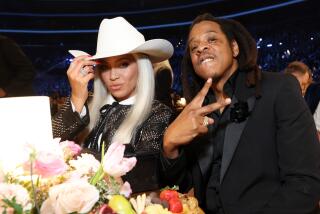KOST-FM Officially Lifts Ban on Same-Sex Music Call-Ins
- Share via
Amid plans for a massive gay call-in Monday night, KOST-FM (103.5) permanently lifted its long-standing ban on same-sex music dedications during its nightly “Love Songs” show.
Programming director Jhani Kaye called the decision “overdue. This is 1994, and we’ve seen gay topics frequently discussed on the TV and radio talk shows. We’re not leading the way. We’re just playing catch up.”
Lee Werbel, executive director of the Gay and Lesbian Alliance Against Defamation, expressed pleasure that “a major radio station is acknowledging gays and lesbians and their relationships.”
KOST had been experimenting with same-sex dedications for the past month. Monday’s call-in, which helped tie up the station’s phone lines for hours, had been promoted in five gay and lesbian publications, and in leaflets passed out in West Hollywood, as a means of convincing station executives to continue the dedications. GLAAD officials weren’t aware of another local station that has a permanent policy permitting them.
Typical was a call from Daryl in Glendale, who had just broken up with “the true great love of my life,” Bill. Daryl told the deejay and the radio audience that he hoped he and Bill might some day get back together, and dedicated the song “Angel” to his ex-boyfriend.
Informed of the call-in hours before it was to begin, KOST general manager Howard Neal expressed surprise but nevertheless welcomed it.
“As a radio station, our license is issued by the entire community. We want to be responsive to all segments of the community,” he said.
The lifting of the ban began last April with a phone call to KOST by 19-year-old Raul Caudillo, a student at Pasadena City College. Caudillo wanted to dedicate a song to his boyfriend, Brian Dreesman, a fellow student and part-time helicopter pilot.
Caudillo was told by the deejay, however, that same-sex dedications might corrupt young listeners and were against station policy unless the dedication was made using initials or a nickname, such as “Poochie.”
Caudillo told Dreesman about the station’s refusal, and Dreesman wrote KOST a six-page letter.
“If I remained gay after being bombarded all my life exclusively with heterosexual images, what are the chances that a small amount of homosexual images will change the children who are heterosexual?” he wrote. The ban, he said, is “socially destructive and morally wrong. . . . You are hurting those who are gay by depriving them of urgently needed role models and a place in society.”
Kaye found the letter “passionate and convincing,” and discussed it with his staff. In early August, he wrote Dreesman that KOST was tentatively lifting the ban to “see what kind of reaction we receive. We trust it will be positive.”
Dreesman soon called to dedicate a song to Caudillo. “The deejay asked me about Raul. She asked what I liked about him and why. She asked how long we had been together. I told her we’d been together for a year, and how much I liked his good heart and courage. It seemed like we were talking on the air an extra long time.”
The weeks since that and similar dedications went out have been marked by “an overwhelmingly positive response,” Kaye said. “We’ve received numerous letters and phone calls supporting the new policy.”
Monday afternoon, Neal declared that the policy would be permanent.
Told of his victory by a reporter, Dreesman pronounced himself “absolutely elated. I’ve been studying Martin Luther King and Gandhi all my life. This is the first time I’ve had the chance to apply what I’ve learned.”
More to Read
The biggest entertainment stories
Get our big stories about Hollywood, film, television, music, arts, culture and more right in your inbox as soon as they publish.
You may occasionally receive promotional content from the Los Angeles Times.










